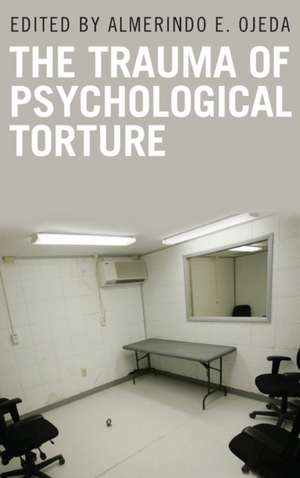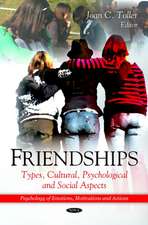The Trauma of Psychological Torture
Editat de Almerindo E. Ojedaen Limba Engleză Hardback – 29 mai 2008 – vârsta până la 17 ani
Preț: 356.10 lei
Preț vechi: 481.76 lei
-26% Nou
Puncte Express: 534
Preț estimativ în valută:
68.15€ • 70.72$ • 56.96£
68.15€ • 70.72$ • 56.96£
Carte tipărită la comandă
Livrare economică 15-29 martie
Preluare comenzi: 021 569.72.76
Specificații
ISBN-13: 9780313345142
ISBN-10: 0313345147
Pagini: 240
Ilustrații: 6 illustrations, 4 figures, 2 tables
Dimensiuni: 156 x 235 x 24 mm
Greutate: 0.53 kg
Editura: Bloomsbury Publishing
Colecția Praeger
Locul publicării:New York, United States
ISBN-10: 0313345147
Pagini: 240
Ilustrații: 6 illustrations, 4 figures, 2 tables
Dimensiuni: 156 x 235 x 24 mm
Greutate: 0.53 kg
Editura: Bloomsbury Publishing
Colecția Praeger
Locul publicării:New York, United States
Notă biografică
Almerindo E. Ojeda is Founding Director of the University of California Davis Center for the Study of Human Rights in the Americas (CSHRA). CSHRA is an academic research center founded in 2005, aiming to gather information about human rights in the American continent, to interpret it through cross-cultural perspectives, develop legal instruments for human rights protections, create relevant curricula, and enhance human rights across the continent through action. Ojeda is Professor of Linguistics at the University of California Davis.
Cuprins
Series Foreword by Gilbert ReyesIntroduction- Almerindo E. Ojeda1. What Is Psychological Torture? - Almerindo E. Ojeda2. Psychological Terror as a Cold War Imperative - Matthew Gildner3. Legacy of a Dark Decade: CIA Mind Control, Classified Behavioral Research, And the Origins of Modern Medical Ethics - Alfred W. McCoy4. Psychologists, Detainee Interrogations, and Torture: Varying Perspectives on Non- Participation - Stephen Soldz and Brad Olson5. Doctors as Pawns? Law and Medical Ethics at Guantánamo Bay -Jonathan H. Marks6. Neuropsychiatric Effects of Solitary Confinement - Stuart Grassian, MD7. Prison and the Decimation of Pro-Social Life Skills - Terry A. Kupers, MD, MSP8. The Neurobiological Consequences of Psychological Torture - Rona M. Fields9. Documenting the Neurobiology of Psychological Torture: Conceptual and Neuropsychological Observations - Uwe Jacobs10. The Tortured Brain - Claudia Catani, Frank Neuner, Christian Wienbruch, Thomas Elbert11. The Case of Mohammed Al Qahtani - Gitanjali S. Gutierrez, Esq.12. The Case of Salim Hamdan (Declaration of Daryl Matthews)- Daryl MatthewsIndexAbout the Editor and Contributors
Recenzii
Psychologists interested in becoming familiar with the torture debate, particularly within APA, will find this book quite useful.The Trauma of Psychological Torture provides a useful compendium of knowledge about systematic psychological torture and coercion in the context of war and provides justification for efforts by members of APA and the American Psychiatric Association to not sanction such practices.
Each of the twelve chapters offers fresh perspective on a surprising range of issues. . . . The Trauma of Psychological Torture goes well beyond an analysis of the psychological and physiological effects of torture. . . . The range of makes this book a surprisingly panoramic work that would be a welcome read to anyone interested in gaining a better understanding of torture as it exists today. . . . The Trauma of Psychological Torture offers a helpful view of issues involving the responsibility of the medical profession, the neurobiological effects of torture, and the historical emergence of so-called 'psychological torture'-but it also provides us with an ethical demand-namely, that we think carefully about our current practices, as well as the categories we use to describe them.
Founding director of the Center for the Study of Human Rights in the Americas, Ojeda (linguistics, Univ. of California, Davis) merges perspectives on psychological torture from psychology, psychiatry, neuropsychology, neurobiology, history, and law.This is a comprehensive, useful addition to literature on torture.Recommended. Graduate students, researchers, faculty.
Each of the twelve chapters offers fresh perspective on a surprising range of issues. . . . The Trauma of Psychological Torture goes well beyond an analysis of the psychological and physiological effects of torture. . . . The range of makes this book a surprisingly panoramic work that would be a welcome read to anyone interested in gaining a better understanding of torture as it exists today. . . . The Trauma of Psychological Torture offers a helpful view of issues involving the responsibility of the medical profession, the neurobiological effects of torture, and the historical emergence of so-called 'psychological torture'-but it also provides us with an ethical demand-namely, that we think carefully about our current practices, as well as the categories we use to describe them.
Founding director of the Center for the Study of Human Rights in the Americas, Ojeda (linguistics, Univ. of California, Davis) merges perspectives on psychological torture from psychology, psychiatry, neuropsychology, neurobiology, history, and law.This is a comprehensive, useful addition to literature on torture.Recommended. Graduate students, researchers, faculty.









